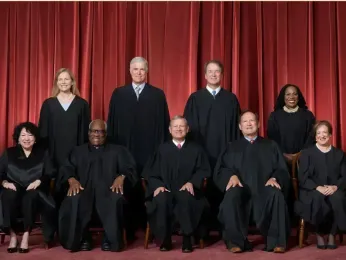
Jun 18
US Supreme Court upholds gender-affirming care ban
Lisa Keen READ TIME: 6 MIN.
In a 6-3 decision written by Chief Justice John Roberts, the U.S. Supreme Court on Wednesday ruled that states may ban gender-affirming treatment for minors, even when their parents want it for their child. The decision is a major setback for transgender rights, LGBTQ legal advocates said.
In U.S. v. Skrmetti, Roberts said the specific law in question – Senate Bill 1 from Tennessee – does not discriminate on the basis of sex because minors are prohibited from receiving gender dysphoria treatment “regardless of the minor’s sex.”
The majority said it rejected the plaintiffs’ argument that SB1 “enforces a government preference that people conform to expectations about their sex.”
“SB1 does not exclude any individual from medical treatments on the basis of transgender status,” the decision stated. “Rather, it removes one set of diagnoses – gender dysphoria, gender identity disorder, and gender incongruence – from the range of treatable conditions.”
U.S. v. Skrmetti originated with one transgender girl and two transgender boys, whose parents filed suit after the Tennessee Legislature banned medical treatment for young people diagnosed with gender dysphoria. (Gender dysphoria is defined by the medical profession as clinically significant discomfort that one’s sexual identity is different than one’s documented gender at birth.) A Memphis doctor, Susan Lacy, joined the lawsuit, which was successful at the district court. There, the judge ruled that the ban enables “disparate treatment on the basis of sex.” But the 6th U.S. Circuit Court of Appeals disagreed.
Both the transgender youth and the U.S. government appealed to the Supreme Court. The court accepted the appeal but posed the question with language many might read as putting a thumb on the scales of justice: Does “Tennessee Senate Bill 1 (SB 1), which prohibits all medical treatments intended to allow ‘a minor to identify with, or live as, a purported identity inconsistent with the minor's sex’ or to treat ‘purported discomfort or distress from a discordance between the minor's sex and asserted identity'” violate the equal protection clause of the 14th Amendment.
Chase Strangio, a trans man who is co-director of the American Civil Liberties Union’s LGBTQ and HIV Project, appeared before the court on behalf of the plaintiffs last December, becoming the first known trans person to argue a case before the justices. He called the decision “devastating.”
“Today’s ruling is a devastating loss for transgender people, our families, and everyone who cares about the Constitution,” Strangio stated in a news release. “Though this is a painful setback, it does not mean that transgender people and our allies are left with no options to defend our freedom, our health care, or our lives. The court left undisturbed Supreme Court and lower court precedent that other examples of discrimination against transgender people are unlawful. We are as determined as ever to fight for the dignity and equality of every transgender person and we will continue to do so with defiant strength, a restless resolve, and a lasting commitment to our families, our communities, and the freedom we all deserve.”
Sasha Buchert, a trans woman who is director of the Nonbinary and Transgender Rights Project at Lambda Legal Defense and Education Fund, said the LGBTQ legal organization would continue its fight for trans rights.
“This is a heartbreaking ruling, making it more difficult for transgender youth to escape the danger and trauma of being denied their ability to live and thrive,” Buchert stated in a news release from Lambda Legal. “But we will continue to fight fiercely to protect them. Make no mistake, gender-affirming care is often life-saving care, and all major medical associations have determined it to be safe, appropriate, and effective. This is a sad day, and the implications will reverberate for years and across the country, but it does not shake our resolve to continue fighting.”
Shannon Minter, a trans man who is vice president of legal at the National Center for LGBTQ Rights (formerly the National Center for Lesbian Rights), was equally upset with the decision.
“The court's ruling abandons transgender youth and their families to political attacks,” Minter stated in a separate release. “It ignored clear discrimination and disregarded its own legal precedent by letting lawmakers target young people for being transgender. Health care decisions belong with families, not politicians. This decision will cause real harm.”
Oral arguments last year
The court heard oral arguments in December, during the last month of President Joe Biden’s administration. Solicitor General Elizabeth Prelogar, who spoke on behalf of the Biden administration’s opposition to Tennessee’s law, said it discriminates on the basis of sex, in violation of the equal protection clause. She also argued the court should scrutinize the law at a heightened level (greater than the easier requirement of simple rational basis). And she urged the Supreme Court to send the case back to the 6th Circuit with instructions to examine the ban with that heightened level of scrutiny.
In February, the Department of Justice under President Donald Trump wrote a letter to the court, stating, “The Department has now determined that SB1 does not deny equal protection on account of sex or any other characteristic. Accordingly, the new Administration would not have intervened to challenge SB1.” The letter carried the name of Curtis Gannon, deputy solicitor general.
The June 18 decision vote broke down in the usual split: The six conservative justices all joined the majority; dissenting liberal Justices Sonia Sotomayor, Elena Kagan, and Ketanji Brown Jackson.
Leading the dissent, Sotomayor stated that the Tennessee “law conditions the availability of medications on a patient’s sex.”
“By retreating from meaningful judicial review exactly where it matters most,” wrote Sotomayor, “the Court abandons transgender children and their families to political whims.
“In sadness, I dissent,” she added.
Gay California state Senator Scott Wiener (D-San Francisco) issued a statement noting that the decision will hurt many people.
“The Supreme Court’s decision allowing states to ban gender-affirming health care for transgender youth is horrifying and another step toward erasing trans people entirely,” Wiener stated. “It will hurt so many young people who are just trying to live their best lives and be who they are. The court is giving bigots like [President Donald] Trump a permission slip to make it impossible to be trans.
“Major medical associations have been crystal clear that this care is appropriate and medically necessary,” he added. “Only a tiny percentage of trans youth receive this care, and the kids who receive it overwhelmingly do so with the consent and support of their parents. Yet Trump and his cult have created amoral panic that a massive number of young people are having surgery or receiving hormones – which is false – and that they’re doing so behind their parents’ backs, which is also false. And as part of the campaign to eradicate trans people, they’re criminalizing parents and physicians.”
Wiener also pointed out that he’s working to strengthen his trans refuge law that Governor Gavin Newsom signed three years ago.
“Now that the Supreme Court has validated these bigoted anti-trans laws, it’s all the more important for California to have trans people’s backs,” he stated. Yesterday, my legislation (SB 497) to strengthen California’s trans state-of refuge law – which helps protect trans people and their parents and doctors from prosecution in other states and protects the privacy of their health care information – was passed by a key committee. I’m committed to passing this critical protection into law.”
The Human Rights Campaign, the nation’s largest LGBTQ rights organization, was deeply disappointed in the ruling.
“Today's Supreme Court decision is a devastating blow to transgender youth and the families who love them, but it will not break our resolve,” stated Kelley Robinson, a queer Black woman who is HRC’s president. “Families may now have to make the heartbreaking choice to leave their state or split their families, or take on extensive financial burdens, in order to ensure that their kids can access medically necessary care.
“This court chose to allow politicians to interfere in medical decisions that should be made by doctors, patients, and families – a cruel betrayal of the children who needed them to stand up for justice when it mattered most,” Robinson added.
“As parents, advocates, and community leaders, we know that our fight doesn't end in courtrooms – it lives in our communities, our hearts, and our unwavering commitment to each other. Still, we will not be deterred,” Robinson stated. “We will support families forced to make impossible choices, fund legal challenges, and build a movement so powerful that no politician can ignore us. Together, we will turn this pain into power and keep fighting until every transgender person in America can live with dignity, safety, and the freedom to be who they are.”
Updated, 6/18/25: This article has been updated with comments from state Senator Scott Wiener.




